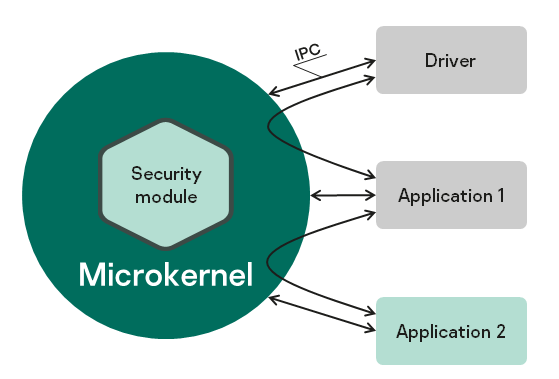Overview
Microkernel
KasperskyOS is a microkernel operating system. The kernel provides minimal functionality, including scheduling of program execution, management of memory and input/output. The code of device drivers, file systems, network protocols and other system software is executed in user mode (outside of the kernel context).
Processes and endpoints
Software managed by KasperskyOS is executed as processes. A process is a running program that has the following distinguishing characteristics:
- It can provide endpoints to other processes and/or use the endpoints of other processes via the IPC mechanism.
- It uses core endpoints via the IPC mechanism.
- It is associated with security rules that regulate the interactions of the process with other processes and with the kernel.
An endpoint is a set of logically related methods available via the IPC mechanism (for example, an endpoint for receiving and transmitting data over the network, or an endpoint for handling interrupts).
Implementation of the MILS and FLASK architectural approaches
When developing a KasperskyOS-based system, software is designed as a set of components (programs) whose interactions are regulated by security mechanisms. In terms of security, the degree of trust in each component may be high or low. In other words, the system software includes trusted and untrusted components. Interactions between different components (and between components and the kernel) are controlled by the kernel (see the figure below), which has a high level of trust. This type of system design is based on the architectural approach known as MILS (Multiple Independent Levels of Security), which is employed when developing critical information systems.
A decision on whether to allow or deny a specific interaction is made by the Kaspersky Security Module. (This decision is referred to as the security module decision.) The security module is a kernel module whose trust level is high like the trust level of the kernel. The kernel executes the security module decision. This type of division of interaction management functions is based on the architectural approach known as FLASK (Flux Advanced Security Kernel), which is used in operating systems for flexible application of security policies.

Interaction between different processes and between processes and the kernel in KasperskyOS
KasperskyOS-based solution
A KasperskyOS-based solution (hereinafter also referred to as the solution) consists of system software (including the KasperskyOS kernel and Kaspersky Security Module) and applications integrated to work as part of the software/hardware system. The programs included in a KasperskyOS-based solution are considered to be components of the KasperskyOS-based solution (hereinafter referred to as solution components). Each instance of a solution component is executed in the context of a separate process.
Security policy for a KasperskyOS-based solution
Interactions between the various processes and between processes and the KasperskyOS kernel are allowed or denied according to the KasperskyOS-based solution security policy (hereinafter referred to as the solution security policy or simply the policy). The solution security policy is stored in the Kaspersky Security Module and is used by this module whenever it makes decisions on whether to allow or deny interactions.
The solution security policy can also define the logic for handling queries sent by a process to the security module via the security interface. A process can use the security interface to send some data to the security module (for example, to influence future decisions made by the security module) or to receive a security module decision that is needed by the process to determine its own further actions.
Kaspersky Security System technology
Kaspersky Security System technology lets you implement diverse security policies for solutions. You can also combine multiple security mechanisms and flexibly regulate the interactions between different processes and between processes and the KasperskyOS kernel. A Kaspersky Security Module to be used in a specific solution is created based on the solution security policy description.
Source code generators
Some of the source code of a KasperskyOS-based solution is created by source code generators. Specialized programs generate the source code in C from declarative descriptions. They generate source code of the Kaspersky Security Module, source code of the initializing program (which starts all other programs in the solution and statically defines the topology of interaction between them), and the source code of the methods and types for carrying out IPC (transport code).
The transport code is generated by the nk-gen-c compiler based on the formal specifications of solution components.
The source code of the Kaspersky Security Module is generated by the nk-psl-gen-c compiler from the solution security policy description and formal specifications of solution components.
The source code of the initializing program is generated by the einit tool from the init description and formal specifications of solution components.